- Home
- Gregory Maguire
Hiddensee Page 5
Hiddensee Read online
Page 5
17.
Another two or three days, or four. Nights in sheds, and once in the back room of a tavern, among barrels of beer that made him drunk on the fumes. Along the Wolfsbach River toward Lindau, then down to a great lake, the Obersee section of the Bodensee—or Lake Constance as he also heard it called. He kept northwest along its shores to pretty Friedrichshafen, crinkled, pleated with sharp shadow in the dawn light. Now that the forest had given way to open spaces again, Dirk could better understand the height of the terrain from which he had descended. Though disappeared from view, the mountains rose in his mind like flat friezes of snow and rock. They hinted nothing of the lives lived within their crags and crevices. All the silent fish and unheard birds. The renegade wolf, the rogue king stag, the parliament of bears.
Dirk walked to the edge of the land to see how it managed to lose itself in the water. There, as luck or grace would have it, he was offered passage on a steamboat if he might help an elderly dame and her crippled son manage their valises. And so he made his way to Meersburg handily enough.
18.
Meersburg, seen from across the water. A small walled city in two parts, a lower town near the lake and an upper area bristling with municipal stateliness. A stone jetty reached toward them as they approached from the east. A breakwater of sorts. Boys were fishing there, and men repairing nets. The quay beyond, a staging area for commerce and drama. “Mind your wallet in this crowd,” said the old Dame as she departed. But he had no wallet to worry over.
Either Dirk hadn’t listened correctly or Pfarrer Johannes himself hadn’t understood. According to the dockworkers on the quay, the local Bishop’s palace had been appropriated for civic uses a decade or so earlier. True, the Roman Catholic Bishop, whose seat had been relocated to Constance across the lake, had indeed been seen in Meersburg earlier that season. Now, however, he was taking a few weeks as the guest of a wealthy family who repaired annually to their lakeside schloss some distance west of the city walls.
A cheery farmer offered Dirk a ride in a cart heaped with dung. By late afternoon, Dirk had escaped the cloud of flies and made his way to a pair of gates. Beyond the iron fretwork, the house looked like a generous slice of old creamy egg-bread set upon the flashing blue tablecloth of the lake. All the flourishes of iron seemed to Dirk like the alphabet of an unfamiliar script. Its message was clear, though: Stay Away.
Ah, but I have a job to do, said Dirk to the gate, and pulled on a bell-rope.
Dirk had long since realized he was talking to himself in moments like this, so he wasn’t surprised that the gate didn’t reply.
An underling scurried to work the latch. Dirk was led to a side door, where he was interviewed by an overseer of some sort. Dirk was told: “The good Bishop is indeed in residence, but His Excellency is at his oblations. You will repair to the kitchens. You will take a meal and wait for a reply. If the Bishop needs time to compose his thoughts, you will take a bed in the servants’ quarters.”
Mercy, a real bed: That would be a first.
The kitchen proved a well-scrubbed inferno of roasting meats. The property’s extensive staff seemed accustomed to visitors, and no one stared at Dirk or talked to him. A fleshy young damsel with hot pink cheeks, her bare arms freckled with orange, slapped before him a dish of veal stew with potato dumplings. He ate with gusto. A youth in a blooded apron bolted through from some stables with the news that the Baron’s son and his university entourage had just arrived unannounced and would be sat at table that evening. Eight more heads. “Ach,” said the head cook, “I am to prepare vegetables and potatoes with what, my toes, while my hands are finishing the strudel?”
“I can peel potatoes,” said Dirk. He took out his gnome-hasped knife and pushed aside his bowl for later.
Because the Bishop sent word that there’d be no immediate reply to Pfarrer Johannes Albrecht’s request for compensation for damages, Dirk Drosselmeier might have left the schloss von Koenig that evening. But the idea of the young kitchen maid—wringing bread flour out of towels in the doorway—gave Dirk pause. As he delayed, he was put to work again, and so without a formal arrangement he became a member of the summer staff.
Dirk fell in love, first, with the notion of his own bed, which stood in a row of five in one of the men’s dormitories above the kitchens. It came with its own pillow and its own hay mattress under striped ticking. After a while Dirk became enamored, second, with the notion of sharing this bed with someone. The pink-vermilion kitchen assistant, Hannelore, so often stood in his path, scowling and smelling delectably of onions and rampion, that he wondered if she ought to be his first. He was uncertain how to begin.
19.
Upon a knoll overlooking the lake, quite apart from the schloss, a Catholic chapel minded its own business under shaggy hemlocks. The von Koenig dynasty once must have adhered to Rome, though to judge by the look of decay no one was currently devout. Or not in the summertime.
Dirk had no language for architecture. The building was small. Its bell tower was capped with a wooden dome in the shape of a turnip, through neglect listing as a real turnip will. Narrow colored-glass windows lanceted the stone walls, but from the outside they looked mostly umber. As the doors to the place remained locked, he could neither confirm nor ruin his uncertain faith by seeing for the first time sunlit stained-glass windows from the inside.
One afternoon toward the height of summer, when the dogs lay about drooling into their shadows, Dirk took his leave of the pantries. He was keeping an eye out for Hannelore, who sometimes strolled down to the boathouse with an expression that suggested a winsome sort of boredom. Dirk was passing the vine-gripped chapel when he drew up short. The door stood open, and a single voice issued from the shadows. The noise was plangent, persuasive, but of what? Unforgettable—indeed, he never did forget it, his whole life long. Told sharply never to approach or address the von Koenig family or their guests, Dirk nonetheless was drawn in. He stood and stared with his eye, but his ears were staring harder.
A figure with rolling locks was hunched over a stringed instrument of unusual size. Of music, Dirk had known only the reedy wheeze of Pfarrer Johannes’s harmonium, with its tendency to bust a valve and leave the parish chromatically impoverished as it brayed through the militance of foursquare anthems.
This sound rolled forth. The strung melody seemed just the length of a line as sung by a human, breaking where a human voice would break for breath. As his eye adjusted to the shadows, Dirk saw the musician—a young man in a high-collared white shirt and billowy sleeves rolled to his elbows—who was caressing the exposed sternum of the instrument with a bow. He might have been bestowing loving attentions to a kneeling figure. Dust in the nearly empty room swirled around him; colored light from an Annunciation window made him crimson; from a Transfiguration, verdigris.
He finished at last, that crimson and copper-green one, and turned to Dirk.
“I don’t mean to interrupt,” said Dirk.
“I didn’t stop till I was through,” replied the man. The voice was refined, the glance bold. “You look as if you’ve seen a doppelgänger.”
“I should go.”
“I’ll play another in a moment. I’m resting the pads of my fingers. Out of practice.”
“What is it?”
“Bach.”
“No, I mean—?”
“A violoncello. You’ve never seen a ’cello?” Dirk shook his head. “Come, have a look.”
“How does it do that? How do you do it?”
“Bach is the genius; the ’cello is his voice. I’m only the keyhole through which it pours. Mostly I try to keep out of the way and let the message work through me.”
This was beyond Dirk. “But it sounds—” He couldn’t find the way to say it. Some memory of—something—speaking beneath or without words. “Bach is a Christian musician,” he tried, flailing.
“Yes, Bach is Christian, but the ’cello suites are more like Euclidean arguments.”
“I don’t know w
hat you mean. What do the suites argue?”
“I don’t know, but they do it so convincingly! Don’t you agree?”
The statement seemed nonsense—how could you be convinced by something wordless? Yet Dirk paused, and then nodded.
The man began to tighten the pegs on the head of the ’cello, coaxing the instrument into tune. “I’m Felix,” he said, between repeated iterations of nearly the same note. “At Wittenberg with the Baron’s son. Guest of the household.”
“I’m nobody,” said Dirk.
“A music lover, anyway. Want to hear another? The E-flat major.” Without waiting for an answer, he lifted his chin and raised his bow, and he brought forth the haunted disquisition. Dirk settled on a bench at the side and closed his eye. Luminous colored patterns played upon his more capable eyelid as, outside, clouds shuttered and unshuttered the light through some Revelation or other.
20.
Upon leaving the church, Felix said, “I come here often to practice because the sound against the stone is profound.”
“Oh,” said Dirk.
“I’m told to put the key here,” said Felix, showing Dirk where it was hidden. “Come see me again. I shall play more for you.”
“I don’t know if I can tolerate more,” said Dirk. But perhaps that sounded rude.
“You can tolerate more,” said Felix. “I’ll prove it to you.”
That evening the Bishop departed for Meersburg, and thence, it was said, across the great lake to Constance. The subject of a reply to Pfarrer Johannes hadn’t been broached again. This left Dirk as an independent lad upon his own road, as Pfarrer Johannes wasn’t going to come after him any more than the old man and old woman in the forest had done.
Dirk wandered by the lake edge, hoping Hannelore might happen along. Sharpening the horizon to knife-edge, a moon was rising in a sky tinted Siberian iris, making of the water of Obersee a black restlessness.
The world was a set of alternations, resistance and persistence, writ up in lake and the distant Alpine peaks of eastern Switzerland. In fact, the world was no easier to understand than Bach.
It seemed that the world was no more wonderful than Bach.
It was no less wonderful, either.
Magnificent imperturbability, exactly sized, one to the other.
What did that mean about Bach, about the world?
21.
He lay down with music in his mind, but not many thoughts about it. If there were words with which to consider music, he didn’t know them. He thought of Felix bending over the ’cello and coaxing from it such testimonies of longing. Or perhaps there was no such thing as meaning to be found in those lines—not aspiration, not any human feeling. Perhaps the suites were just congeries of certain notes shaped by different keys and modalities. Nothing more than that.
But how could nothing masquerade as longing?
Dirk knew a little about longing. The man four beds down from him was a lesson in carnal appetite, and the woman who came to his bed with him answered it, like another instrument. She was a seamstress from Meersburg, and she showed up every fourth or fifth night. Despite all the other men in the room, who like Dirk turned their backs to the couple in the farthest bed, the junior plowman and the seamstress conducted their exertions with no sentimental comment but a lot of commitment to the cause. She fled before dawn. No one ever mentioned her existence to the field hand, but when he left to see her to the back gate of the estate, the others in the dormitory graded the performance and made snickery character assault.
By this Dirk knew that, should Hannelore ever indicate interest, he couldn’t bring her to his own bed.
This week Dirk had been set to fastening loose roof tiles on the barns before the winds of winter could fling them away. There were only so many tiles that needed tending. When he’d completed his task, he avoided the overseer’s office, to which he usually reported, and went skulking about the kitchen yard. He hoped to find Hannelore at a task, and there she was, shelling beans.
“The idiot from upslope,” she commented. “What do you want?”
He wanted her to lower her dress off her shoulders and lift it above her knees so it was only a bolster of fabric around her middle; he wanted to look at her front and back and all around, and to stroke her up and down. “Nothing,” he said.
“Good, because nothing is what you are going to get.” She kept to her work, though Dirk noticed that she slowed down a little. “Where are you going when this is over?”
“When what is over?”
“The family doesn’t live here in Überlingen the year round. The winds off the lake are too cold. They do have chambers in Meersburg, but primarily they root themselves in Munich. Will they take you with them?”
“I haven’t thought to ask.”
“Well, don’t. Why are you looking at me like that, squinty?”
“You are a pleasure to look at.”
She scowled more fiercely than ever. “I’ve both my eyes on the miller’s son. Don’t get notions. I find you scrappy and impertinent.”
“Will you come walking with me?”
“And leave the beans to shell themselves?”
“If I help you it will go faster, and then we can walk.”
“I don’t want a stroll, but I’m tired of doing these beans. And this is my last chore before a break.” She shifted on the bench, which Dirk took as an invitation to join her. He learned quickly. They worked in tandem like a four-armed automaton. She smelled of sweat and late strawberries, sweet to the point of stinging.
Returning from the kitchen where she’d delivered the shelled beans and discarded her apron, she shrugged at him and scratched her hip and pointed a thumb out the kitchen-yard gate. They left and walked together in the dozy mid-afternoon heat. All the guests and the family were napping or otherwise being quiet. A few children ran about on the lawns with a puppy, but they paid no mind to the servants, and Dirk and Hannelore returned the favor.
Dirk tried to put his hand in Hannelore’s, but she would have none of it. “So public here on the road, anyone could see, and tell the miller’s son.” She snorted.
So at the abandoned chapel Dirk said, “Wait,” and he got the key from its hiding place and opened up the door. He closed it behind him but didn’t lock it, for he didn’t want her to feel she was being imprisoned against her will. “This is private enough,” he said.
“No one comes here.” She sniffed at the wood rot and the mold and perhaps the ornamentation. “Who would?”
He put his hands on her shoulders. “My name is Dirk.”
“Of course I know that, I asked. Dirk Dummkopf, I know all about it.”
“I’m not slow.”
“Well, you’re not hasty,” she replied, and took one of his hands off her shoulder and put it against her bosom. He marveled at the size of her breast, at the feeling of mobility of cloth riding over the skin riding over firm yet tender mass. Then she sighed and undid the top two ties of her shift. “Your hand belongs inside the clothing. I see you’ve had no experience.”
“I’ve watched you for a month now.”
“And you haven’t noticed I have another one of those on the other side? Pity about the gruesome eye. This is like teaching children how to roll on their stockings.” She guided his other hand. He wasn’t sure if he should be tender or testing, but he so loved his hand upon the curves—they were exactly the right size for a man’s hands. She put her own hands on her hips and whistled while he closed his eye and let his palms float like swan’s down upon the waters. The sides of his thumbs brushed against her nipples, which went hard. He wasn’t sure this was welcoming to her and he withdrew his hands.
“Are you worried about consequences? I’ve been down to the dock before, you know; I’m readied.” Her voice was still hard but her words seemed chosen by kindness. He thought he knew what she meant. “Are you going to kiss me?”
He kissed below her ear, on the edge of her chin; he kissed her nose, the knuckles on her clenched h
ands, which now were nearly tucked inside of her elbows. She seemed open and closed at the same time. He was confused, but he expected this is what was meant to happen.
“You fool, kiss my mouth,” she said. He didn’t want to approach that bitter mouth. He dove toward her neck and put his arms around her waist, but that seemed to lead nowhere particularly.
“You’re abashed by the open space in front of the old altar,” she said at last. “I suppose I can understand. Come, we’ll climb to where the choristers used to sing. We can disrobe there and lie down.”
She found the door to the choir loft and led him by the hand. His heart was racing. The stair-hall was dark, the steps dotted with mouse turds. The thick dust made him sneeze.
In the loft she spread out some moth-eaten vestments on a pew and sat down. She lowered her blouse just as he had hoped she would. She took off her wooden shoes; her bare, callused feet looked like swedes. Hannelore’s face seemed bright and sad in the gloom. “Well, come on, I have just so long,” she said, and lay back upon the pew with an arm over her eyes.
Dirk had never had the coarseness—or courage—to peer at lovemaking in the men’s dormitory: how a man might lie with a woman. For a country boy, he was rather vague on the mechanics of sex. The old woman and the old man had kept a single pig and a cow and some chickens, and despite all his years in the pulpit, Pfarrer Johannes Albrecht had never lectured on methods of human intercourse. Dirk knew he was to lie with Hannelore, though there was hardly room on the pew. If he lay right upon her he might squash those lovely breasts, which now were rolling to each side as if they’d prefer to be set on the floor with the shoes and wait till this business was concluded.
“Come on, then; have I to teach you what your candle is for?” asked the girl.
Gingerly, trying not to settle his full weight upon her, he suspended himself like a plank above her. He used his hands to take some of the weight off her torso, but she arched her hips and battered his midriff with hers as if to get his attention. “Are you entirely made?” she asked, beginning to work at his buttons.

 Missing Sisters
Missing Sisters Wicked: The Life and Times of the Wicked Witch of the West
Wicked: The Life and Times of the Wicked Witch of the West After Alice
After Alice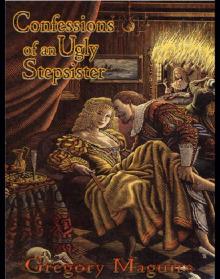 Confessions of an Ugly Stepsister
Confessions of an Ugly Stepsister Son of a Witch
Son of a Witch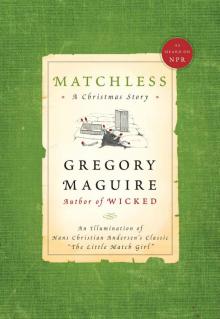 Matchless
Matchless The Next Queen of Heaven
The Next Queen of Heaven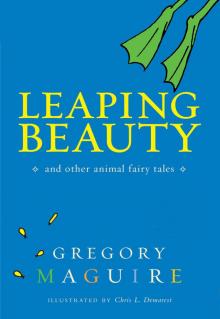 Leaping Beauty: And Other Animal Fairy Tales
Leaping Beauty: And Other Animal Fairy Tales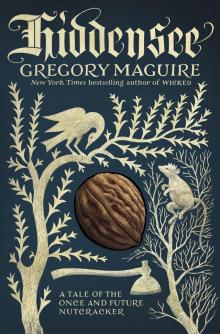 Hiddensee: A Tale of the Once and Future Nutcracker
Hiddensee: A Tale of the Once and Future Nutcracker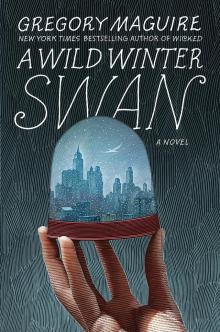 A Wild Winter Swan
A Wild Winter Swan Egg & Spoon
Egg & Spoon Out of Oz
Out of Oz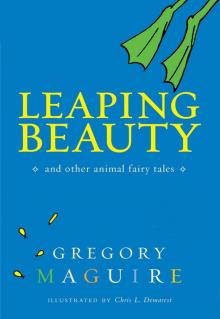 Leaping Beauty
Leaping Beauty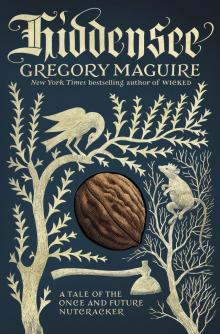 Hiddensee
Hiddensee The Wicked Years Complete Collection
The Wicked Years Complete Collection The Next Queen of Heaven: A Novel
The Next Queen of Heaven: A Novel